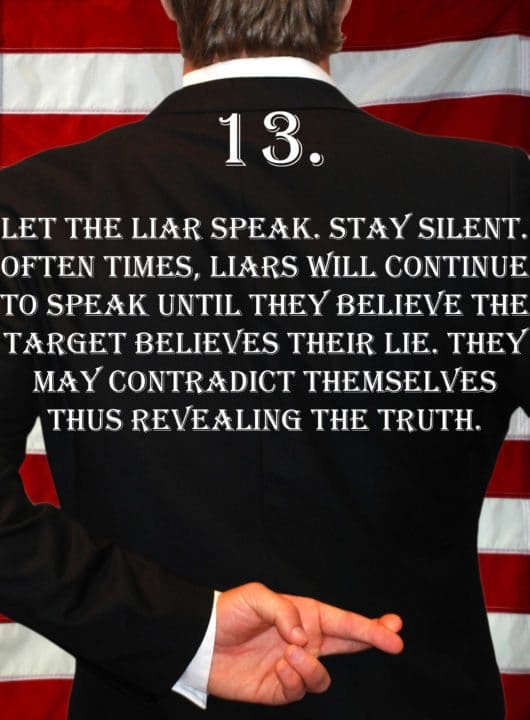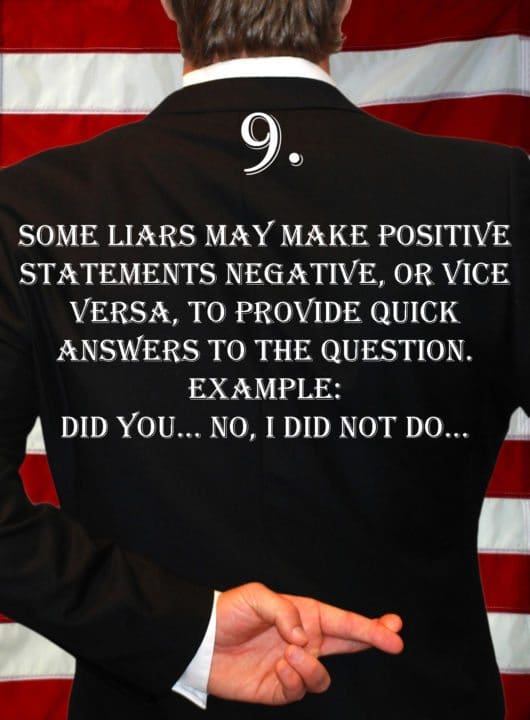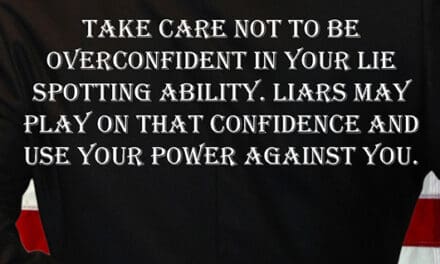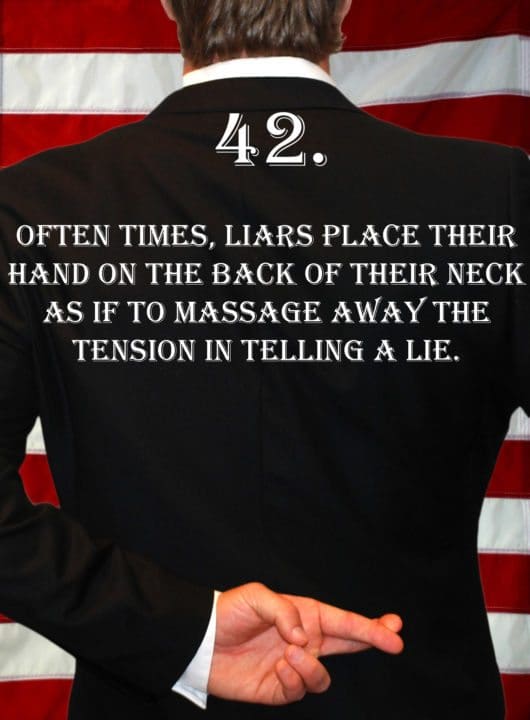
Deception Tip 13:
Let the liar speak. Stay silent. Often times, liars will continue to speak until they believe the target believes their lie. They may contradict themselves thus revealing the truth.
Listen To The Podcast!
E13 – Stay Silent – Deception Tips Podcast – Click Here To Subscribe
Podcast Transcript
Hello, and welcome to the Deception Tips Podcast, where you will learn amazing cues to detect deceit that will help you read people like never before. I’m your host, Spencer Coffman. Let’s get started.
Hello, and welcome to episode 13 of the Deception Tips Podcast. I want to thank you for continually tuning in, and if you’re still listening after this 13th episode and you are subscribed somewhere, I would encourage you, I would love it if you would leave a review for this podcast and let me know what you think. Let others know what you think. Share it with people.
Let’s spread the word and help people learn how to detect deception, and spot lies so that they’re not taken advantage of. You don’t want to be taken advantage of. Do you want your friends and your family to be taken advantage of either? I hope not. I really don’t think so. So, let’s spread the word. Let’s share this with them.
But today is episode 13. And last time, we spoke of a certain sign of deception that isn’t really considered a sign of deception, it’s more of something you can notice to determine whether or not people are being deceptive.
It is a cluster of signs. It is a pattern of behaviors and it is something that occurs when people are talking and their gestures don’t match up. Speech and gestures must occur simultaneously in order to know that people are telling the truth.
I mentioned that it is important to watch some TV. Watch the news anchors, the politicians, and reporters. The reason these are great people to watch is that the camera is focused straight-on. It is the perfect straight-on shot so you can see their hand gestures. You can see their face.
You can see a lot that you need to see in order to determine whether or not they’re being deceptive. It’s not like watching TV shows where sometimes people talk offscreen or you only see part of their body or something like that. In addition, TV actors are acting so they may not always display the signs that they need to display when it is in real life such as politicians, news anchors, reporters, etcetera.
So, watch those people. You can even watch it on mute to watch the body language only, but the point is, check those people out. Watch what they do. See if you can notice their speech and body language in synchrony.
In addition, we talked about Bill Clinton. I hope you watched that video clip, and also the Nixon video clip, and the karate-chopping man of recently. I hope you figured out who it was. If not, I will reveal it to you now. It was Kasich.
He was my karate-chopping-man as I saw in his debates and whenever he spoke, he always had his hand out there in a karate-chop fashion, and his speech was always in line with him moving his hand up and down like a taekwondo dude.
Anyway, today we are going to talk about a different sign of deception that isn’t a sign of deception at all. I mean it is a sign, but it’s not an outward sign. We’re starting to get into a few signs where you need to use a little bit more of your intellect and a little bit more strategy to determine whether or not these people are telling the truth.
We’ve covered several body language signs and gestures, signs of speech, and different things like that. Now, we’re kind of getting into a few where you need to reason. Use your reasoning and logic to determine whether people are lying.
So, this sign isn’t an outward sign at all, but it is an excellent strategy for determining whether or not someone is telling the truth. So, here it is. Deception Tip 13: Let the liar speak. Stay silent. Oftentimes, liars will continue to speak until they believe the target believes their lie. They may contradict themselves, thus revealing the truth. Here it is again. Let the liar speak. Stay silent. Oftentimes, liars will continue to speak until they believe the target believes their lie. They may contradict themselves, thus revealing the truth.
So, there are several portions of this tip. The first, and most important is to let them speak. You need to let them talk. Liars have a story inside of them. They’ve spent hours and hours thinking of this story, this lie, and possibly rehearsing it in their mind over, and over again. They’ve thought of it. They’ve planned it. They’ve practiced it. They’ve rehearsed it.
They want to get this lie out. There’s so much tension boiling up inside of them that they cannot wait to get this out. It is like a boiling pot, like a tea kettle, and you have that boiling water inside and it’s rumbling, and rumbling, and rumbling, and then pretty soon that whistle blows. That steam is dying to get out of there.
Just like liars, that lie is dying to come out. So, let them speak. And the only way you can let them speak is if you stay silent. So, shut up! Stop talking! Let them talk and they will tell you everything you need to know.
If you let the liar talk, they are going to have so many opportunities to trip over their tongue, to exhibit certain body leakage that you can see, and to have all kinds of signs of deception. But, if you keep talking, you’re never going to see anything because the only way that they are going to leak signs of deception is if they have a chance to tell their story. So, shut up and let them talk.
Oftentimes, the liar will continue to speak until they believe that you believe their lie. So, this is the second portion of this tip. The first one is: to be quiet. The second one is: that they will continue talking until they believe that you believe their lie.
Oftentimes, liars want SO bad to convince you that what they’re saying is true, that they keep talking. It’s like a salesman, like a car salesman, who oversells the car. Liars often oversell their lies, but they only oversell them if given the opportunity.
Oftentimes, so many people question the liar and they keep questioning him and then they stop and the liar doesn’t have that chance to oversell their lie. So then, the target believes them and becomes duped. They’re fooled. Well, they are a fool because they didn’t listen to this tip and they didn’t stop talking and let the liar oversell their lie.
You’ll know, if you’ve ever experienced a salesman who oversells something, that the minute they start overselling things, you know. “Alright. This is dumb. It’s foolish. Why would I stick around?” Well, because it sounds so funny. When people start overselling things, you can tell right away that they’re overzealous. They’re desperate. Something’s wrong. You know it’s unnatural. So, if you allow the liar to oversell their lie, you’ll quickly realize that it is indeed a lie and not a truth.
The next portion is that if you allow them to continue talking, they may contradict themselves and, thereby, they’ll reveal the truth. When they’re talking and they’re given the opportunity to continue talking, they often may say one thing, and then later, because it’s a lie, they may not quite remember exactly how they said it, or what they said. So, then they’re going to say something different and that’s a contradiction.
And if you can remember what they’ve been saying, and point out those contradictions, you’ll start pointing out tons and tons of holes in their story, and pretty soon they will not know which way is up and which way is down and you will have them over a barrel.
They will know that you have caught them in their lie and the only way that you can do that is if you stay silent, let them oversell their lie, and let them contradict themselves. So, we’ll talk more about these things, when we come back. Stay tuned.
Spencer Coffman has been studying body language since 2010. He’s certified at the expert level in subtle expression and micro-expression training. Download his books on spencercoffman.com
One of the most important parts of body language, in deception, in interrogating people is letting them talk. They need a chance to tell their story and they want to tell their story. And, when you interrogate or question somebody, your purpose is to hear their story. So, if you continue talking and do not let them have ample opportunity to express themselves, then you have failed as an interrogator. Therefore, let them talk. Don’t fail as an interrogator.
Now, what does it mean that liars continue talking until they convince themselves that the target believes their lie? Liars need to convince themselves of the lie itself. This is why they spend countless hours and countless times rehearsing the lie. Going over it. Thinking of it. Planning it. And making sure that there are enough details.
Now, they don’t consciously think about all these things and make sure that it’s going to be believable. They just think about it and rehearse it so they can get the lie out.
Most of the time, liars do not meticulously plan their lies. If they did, then they would be a lot more believable. So, for example, psychopathic people or sociopathic people, probably rehearse and plan their lies, and then they’re believed. But most people do not go that in-depth.
They simply rehearse a lie. “Ok. Let’s see. We’re going to tell them we went to the store first, then we were riding our bikes and we left and we found these knives on our way home and that’ll work.” Instead of saying, “We stole them from the store.”
So, that’s how they do it. They rehearse that lie. Then when they’re going through and telling that lie to someone when they’re questioned, they have that rehearsal down and they tell it. But then when people are quiet, they are still feeling a little bit guilty that maybe they stole that thing and, not only did they steal it but now they lied about it.
So now there are two things they’re feeling guilty about. And this is the case with any type of lie. Liars often have a conscience and they will feel guilty about the thing that they did and then the fact that they are lying about it.
This means that when they’re working to convince the target of their lie, they’re also working to convince themselves of the lie. So, they will continue talking trying to, not only convince the target into believing the lie but also talk themselves into believing the lie.
Trying to get past that guilt or get it out of their conscience. They’ll say, “Yeah! We found them. That’s right. We, we found them.” “Well, where did you find them?” “Well, we found them on the side of the road.” Then later, they may end up contradicting themselves. “Yeah, we found them on the sidewalk when we were riding our bikes home.” “Wait a minute. I thought you said the side of the road.” “Well, the sidewalk, the side of the road. Same area.” “Oh, ok.”
If you let them continue talking, they’ll continue trying to convince themselves of the lie and the target of the lie. Then they will contradict themselves. It is almost a certainty that liars will contradict themselves. Now, they may not openly do it, but they may do it in terms of when you probe them, they’ll contradict.
I remember one time I was asking a question of these people who had run off and they said, “Yeah. We ran off and went to Texas.” And so, that was their story. They ran away and they went to Texas. That’s where they were. That’s where they were going and that’s what they did.
So, as I was interrogating this individual, I kept asking certain questions, and eventually, I said, “Yeah, I’ve never been to Texas. Have you?” Then he said, “No. I haven’t.” And I said, “Aha! So, obviously, you didn’t run away to Texas, did you?” And then, of course, he knew he was caught in his lie.
People will contradict themselves because they can’t help it. If you continually engage and press them and let them talk, and then start asking questions that bring about certain details, or certain facts or draw on certain experiences in their life, then they will answer quickly and promptly. Especially if you are setting the tone and the pace. In that conversation that I give you an example of, I was quickly asking. I was using a rapid-fire approach.
And I was saying things like, “Yeah. It was nice outside, wasn’t it?” “Yup.” “Yeah. It was kind of fun for you, wasn’t it?” “Yup.” “Did you enjoy yourself when you ran away?” “Yup.” “Oh. I’ve never been to Texas, have you?” “Nope- oh.”
And then he realized that he let that slip and I knew that at that moment I had him in that lie because that was their story. Their story was that they went to Texas and he told me all about- Oh yeah. The journey and what they saw, and what they did, and all these things, and how nice it was. And then when I said, “I’ve never been to Texas. Have you?” “Nope.” Well, that right there called him out in that lie.
And now, of course, I could have been to Texas or I could not have been to Texas. It doesn’t matter. But, in that strategy, I used something in his story to continually ask questions and let him talk, and eventually, he tripped over his tongue and contradicted himself, thus revealing the truth.
Now, he didn’t reveal the truth, but he made the truth apparent for me to pick up on it. He didn’t come around and say, “Oh, I’ve never been to Texas. Have you?” “No. Oh, ok I guess I lied there. Sorry.” No. He just said, “No.” And he may not have even realized that he said that or that he contradicted himself, but he revealed the truth inadvertently. And if I was paying attention, which I was, I was able to pick up on it and see it.
When you are questioning someone, or you are asking someone, and they’re giving you a story and you think it could be a lie, let them talk, and stay silent. They’re going to talk until they talk you into the lie and until they talk themselves into the lie. Then, ask for some detailed, pointed questions about specific things in their story.
“Where did you find those knives?” “I’ve never been to Texas. Have you?” Those are direct questions and those are very important because they tell the liar that you were listening to their story and that you may be believing their story because you’re asking questions about things that they said.
You’re not questioning what they said. You’re asking a question about what they said. There’s a difference there. If you question what they said, then they know you don’t believe them. But, if you ask a question about something they said, now they think, “Well, maybe he believes me. He just wants some more detail.” So, that is important.
Always ask questions about the things they say even if you don’t believe them because then they will start to loosen up and breathe easily because they feel that you believe them. Even if you don’t, you always must portray that you are believing them and get them to continue talking. And, eventually, one of those questions that you ask will bring about a contradictory response, and then you have your thread and you can pull it until their whole story unravels.
I want to thank you for listening to today’s episode of the Deception Tips Podcast. I encourage you to share it with your friends, subscribe to the feeds, take a look at the Deception Tips Blog, and also the books I have available. And, as always, tune in next week for a new Deception Tip.
Video Transcript
Hey guys! My name is Spencer Coffman. Thank you for watching the deception tips videos they’re all about teaching you how to read people and detect deception so that you will know if someone is lying to you.
Today we’ve got a sign coming up that- it’s about getting liars to talk. When someone is lying, they want to talk. They want to be heard. They have a story. Whether they’ve rehearsed it or whether it’s a spontaneous lie. Typically, this will be more for rehearsed lies, for things that a liar has thought up, and planned out.
They have a story that they’ve concocted. And, they’ve spent a lot of time, a lot of effort, and a lot of mental stress making sure that that story is perfect/is believable, and making sure that they will be believed when they talk about this story or tell this story. So, they want to be believed.
So, a trick to get them to keep talking is a very simple one and it is one that is very, very difficult to do. So, here it is. Deception Tip 13: let the liar speak. Stay silent. Oftentimes, liars will continue to speak until they believe that the target believes their lie. They may contradict themselves thus revealing the truth.
So, there are a number of very important things within this tip. The most important one is: stay silent. Shut up! Let the liar talk. They have spent who knows how long thinking of and stressing over, this lie. For a liar, there is a ton of tension within them. They’re thinking about- not only will the person believe the lie, what if they mess up? They’re probably sweating bullets.
Lying is very uncomfortable for a lot of people. And, if you’re very comfortable with lying then there might be something wrong with you, but that’s a different topic. Most people are- they feel uneasy about telling a lie. They may feel guilty. They may feel an impending doom. Then later, they may feel bad about lying. So, there’s a whole ton of tension and stress that goes into it.
So, when they want to talk they want to get this lie out as fast as possible- to get it over with. It’s like ripping off a band-aid. They just want to do it. But, if you are talking they cannot do that. Therefore, you need to stay silent and let them talk. Let them tell their lie because, when they are talking, they’re exhibiting much more for you to work with. You can watch them talk and do their little mannerisms/body language. You can sit there and look at all of these signs of leakage and see whether or not you believe them to be telling the truth.
In addition, if you notice something at some certain point in their story, you don’t need to stop them. You don’t need to interrupt them and point it out. You can just jot it down on a little clipboard, or a piece of paper, or wherever, and then come back to it when they’re done and hammer home that certain point that you noticed. They may have touched their eye on, or they may have done something that made you a little bit suspicious. Then you can come back to that later and see if they exhibit a similar suspicious behavior. This way you’ll have seen the entire lie play out. You will have heard their whole story and you have picked out the certain spots that you want to come back to.
Oftentimes, especially if you stay silent, they will even become more uneasy. For example, a lot of people don’t like silence. So, I was silent for less than a couple of seconds there and it kind of was a little bit weird. Like, I should be talking. Like, wait a minute. This is part of the video? You got to keep going. When people are silent, it puts a little awkwardness in there. There’s a little bit of like, “What is going on?”
Now, add that awkwardness and that uncertainty to the chemical cocktail of tension, and stress, and anxiety that a liar is feeling, and their level of- whatever you want to call it anxiety or stress or tension- goes from bad to worse because they’re expecting someone to talk. So, they may just start talking to fill that void. They may not be able to handle that awkward silence and start talking. Then, they may contradict themselves, thus, further revealing the truth.
So, remember. Whenever you are questioning someone, whenever you are talking to someone and they are telling their story or their lie, stay silent and let them speak. It will be very important. You can also watch out for other signs while they are speaking because there will always be more than one sign.
If this is your first time watching these videos, I’d love to have you subscribe to the channel on YouTube. Feel free to leave a comment down there as well with any questions you may have. Also, if you’d like more information we’ve got books, podcasts, blog posts, all available on spencercoffman.com that are dedicated to teaching you what every body is really saying.
Until next time.






